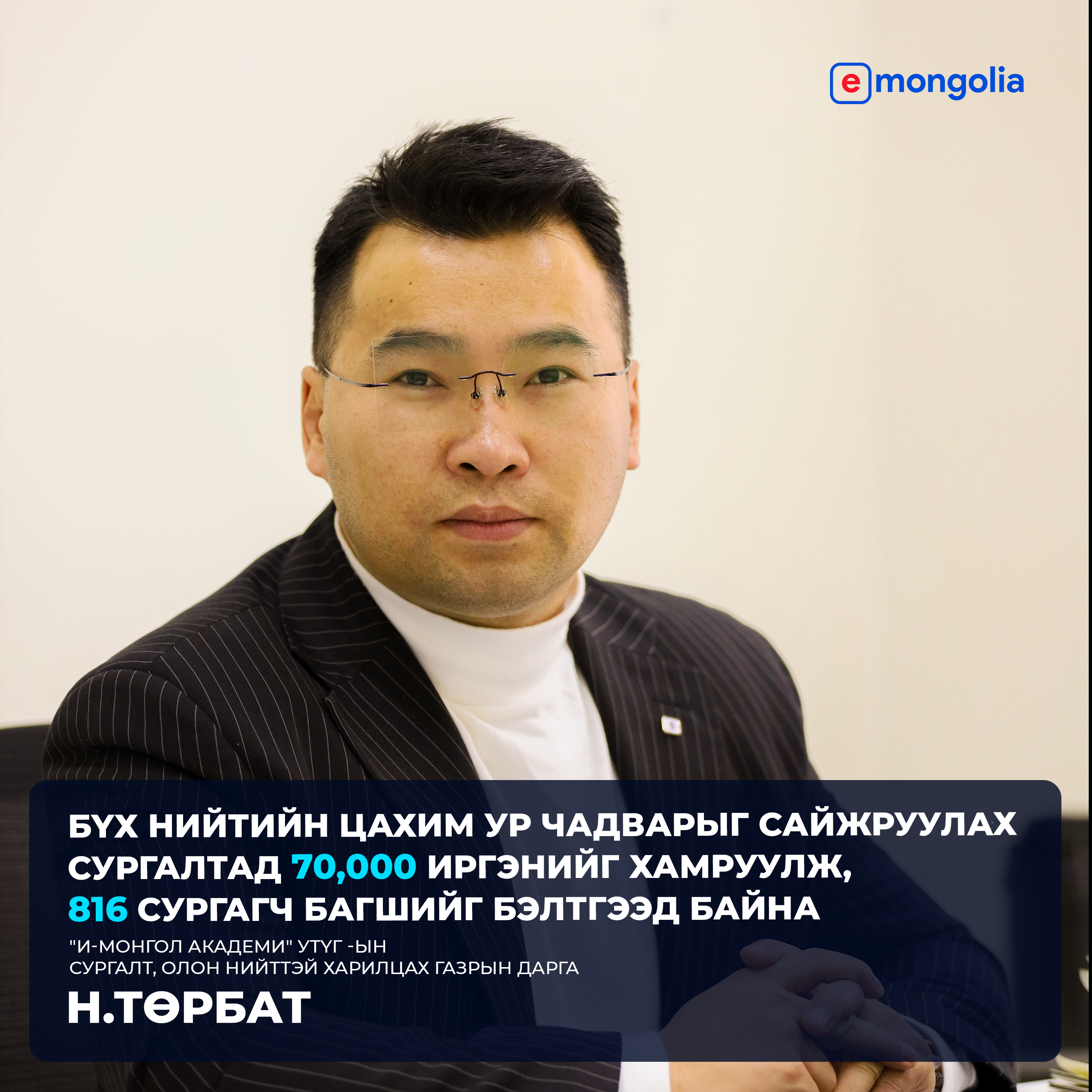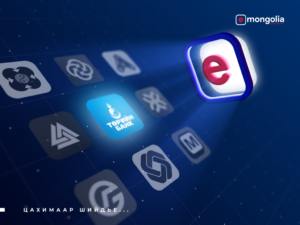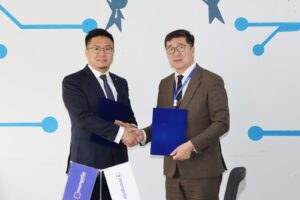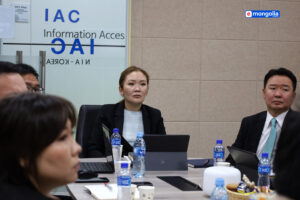In the 21st century, the digital world has rapidly advanced. Just a few years ago, citizens had to spend significant time and visit government offices in person to access services. Today, however, with the advent of smartphones and the E-Mongolia app, these issues can be easily resolved. The digitalization of government services has brought about numerous efficiencies, but the training and development of citizens' digital skills have become essential. To understand how "E-Mongol Academy" state owned enterprise, is contributing to this effort, we spoke with N. Turbat, Director of the Training and Public Relations Department, about their research, initiatives, and work to enhance the digital skills of the public.
- When we talk about improving citizens' digital skills, why is it so important? What exactly do we mean by "digital skills"? Let’s begin today’s conversation by addressing these questions.
In 2020, Mongolia set the ambitious goal of becoming a "Digital Nation" and has been working diligently towards this objective. As part of this effort, it has become crucial for everyone to understand digital information, develop digital skills, and ensure citizens are well-prepared for the digital age. While the term "digital skills" may sound technical, it can be simplified into several alternative expressions. For example, the English term "digital literacy" has been translated into Mongolian as "cyber skills" or "digital competencies."
"E-Mongol Academy" state owned enterprise, has been operating for over two years now. When we talk about enhancing digital skills, we refer to empowering citizens with the ability to understand and effectively use digital information. This includes using smartphones to easily manage everyday tasks, accessing and utilizing information anytime and anywhere, and, more broadly, acquiring the competence to navigate and utilize all aspects of the digital world.
- In today’s world, most people use smartphones. But is formal training necessary to develop digital skills? What challenges and difficulties do individuals face?
In modern society, using digital devices like smartphones and computers has become an integral part of everyday life. While many individuals are self-learning digital skills, there are cases where formal training programs are essential. One of the key challenges in offering such training is the lack of active participation from citizens, often due to time constraints, which results in missed opportunities to acquire valuable knowledge. As a consequence, people may become vulnerable to online fraud, lose personal information, or fall behind in adapting to new technologies.
- When did your organization start offering training to improve digital skills for citizens? How many people have participated so far, and what results have you achieved?
Our organization began offering public digital skills training in March 2022. Since then, we’ve reached over 70,000 citizens through a combination of in-person and online sessions. In addition to the training, we have successfully trained 816 digital skills instructors, who have empowered us to extend our programs to citizens in districts, sub-districts, provinces, and rural areas. In 2024, we also launched a national campaign to promote digital skills across all nine districts of the capital, which achieved meaningful results. As part of this initiative, we developed and launched the website www.digital.edu.mn to host training materials, video lessons, and information on digital skills activities. This platform is now accessible to the public and plays a key role in our efforts to enhance digital literacy nationwide.
- On the basis of which research and analysis are digital skills training programs developed, and which target groups are these programs intended for?
In 2021, the former Communications and Information Technology Authority (now the Ministry of Digital Development, Innovation, and Communications) collaborated with the National Statistics Office to conduct a nationwide survey on the use and accessibility of ICT in households across Mongolia. The findings of this survey revealed that the digital literacy rate in Mongolia stands at 43.8%. Given the country’s population of 3.4 million, this rate represents less than half of the population, indicating that the current level of digital literacy is inadequate. Our organization is actively focused on addressing this gap. Additionally, in 2021, a qualitative survey was conducted under the auspices of the United Nations Development Programme to evaluate the digital skills of individuals within target groups. The results of this survey demonstrated that five key groups—persons with disabilities, the elderly, households with incomes below the poverty threshold, migrant households, and rural or remote households—are disproportionately affected by the digital divide and exhibit lower levels of digital competence.
Globally, there are several established frameworks for enhancing digital literacy, including DIGCOMP, the Digital Literacy Global Framework (DLGF), the International Computer Driving License (ICDL), the Microsoft Digital Literacy Course, and IC3 Digital Literacy. These frameworks encompass a wide range of competencies, such as working with information and data, information security, e-governance, and problem-solving. Countries adapt these frameworks to meet their specific needs and contexts.
In response to this, the Mongolian Government, through Resolution No. 141 in 2024, set out to improve the foundational knowledge and skills in communications and information technology across the population, thereby establishing the "National Digital Skills Framework" with six core areas. Additionally, under the Minister of Education and Science’s Order A/57 in 2024, a framework consisting of 12 competencies was developed to outline the digital, communication, and technological skills that citizens should acquire through formal and non-formal education. Our organization’s training unit has played a central role in the development and approval of these frameworks.
As a result, we now possess official documents that serve as fundamental references for organizing training programs and activities targeted at government employees, students, youth, schoolchildren, senior citizens, and individuals with disabilities."
- How has accessibility for individuals with disabilities been enhanced in the use of the E-Mongolia system, and what regulatory measures are in place?
According to data from our organization, of the 1,951,000 users of the E-Mongolia system, 52,143 are individuals with disabilities. Out of a total of 115,115 individuals with disabilities in Mongolia, 45.2% are utilizing the E-Mongolia system to access government services. Since these individuals with disabilities began using the system, they have collectively accessed 2,096,697 services, with 899,116 services being provided in 2024 alone.
Most of the citizens participating in our training programs are adults, many of whom have limited time for extended sessions. As such, the typical duration of a training session is approximately two hours. We strive to integrate both theoretical and practical components into the training to maximize effectiveness. When involving individuals with special needs in our training programs, we collaborate with sign language interpreters to ensure their full participation.
Our organization employs an instructor with a visual impairment, who not only conducts training but also assists in testing and ensuring that individuals with visual disabilities can fully access information via screen reader software. Based on these assessments, the instructor provides feedback and recommendations for further development and improvement. As a result, both the E-Mongolia mobile application and website have been fully optimized for compatibility with screen reading software, allowing visually impaired users to navigate the system and hear the relevant text and information read aloud.
In terms of accessibility standards, the "Web Content Accessibility Guidelines (WCAG)" are globally recognized as the benchmark for enhancing digital accessibility. These guidelines take into account factors such as the characteristics of internet users, the types of devices used, and internet speed. In essence, adherence to these guidelines ensures that the platform meets accessibility requirements, providing equal access for all users.
What are the organization’s plans for research and academic work moving forward?
The "E-Mongolia Academy" state owned enterprise, is responsible for the development of both core and supplementary systems, system integration, and the organization of training and activities. Since its inception, the Academy has simultaneously engaged in scientific and academic research. Noteworthy contributions include:
- • In 2023, the paper titled "The National ICT Competence Framework" was presented at the International Conference on Science, Engineering, and Technology (ICSET 2023) and subsequently published in an international journal. This conference, held annually since 2011, included participants from countries such as Germany, France, China, Mongolia, Jordan, Algeria, Japan, Kazakhstan, and Uzbekistan.
- • At the 13th International Symposium on Computer Science and Educational Technology (ISCSET), organized by the IBS Foundation in Lauta/Laubusch, Germany, the paper "The ICT Competence Framework for Formal and Non-formal Educational Training in Mongolia" was presented. After undergoing three rounds of peer review and revision, the paper met IEEE standards and was published in a Scopus-indexed journal.
- • On April 24, 2024, the "Open Education 2024" International Academic Conference was held, where 16 papers were presented and discussed.
- • On May 29-30, 2024, at the "Education Challenges and Solutions-2024" research conference, we presented joint papers on "Determining Children's Academic Vocabulary and Categorizing It by Level" and "Results of the National Writing Application Trial."
- • On March 23, 2024, at the "Training-Research-Development 2024" academic conference, the paper titled "Development of the ICT Competence Framework for Formal and Non-formal Education in Mongolia" was presented.
Building on our experience in these domestic and international research endeavors, we are planning to publish articles and papers based on data derived from the E-Mongolia system, exploring the digitalization of government services. We also intend to present our findings at conferences, symposiums, and workshops, share statistical results with the public, and release diverse content to raise awareness. These academic initiatives are scheduled for 2025.



